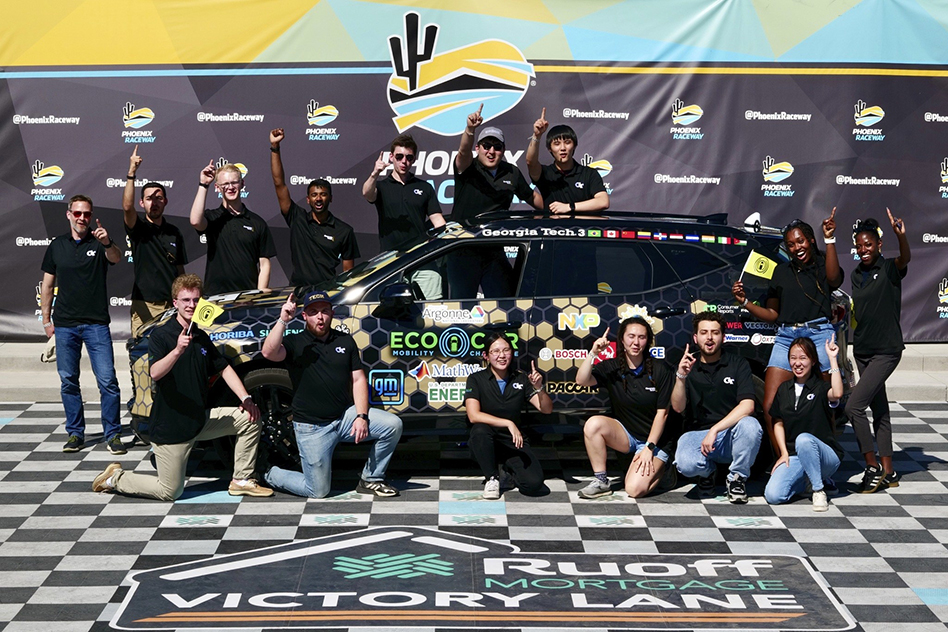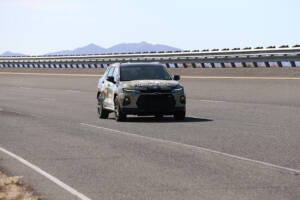
Georgia Institute of Technology has been named The EcoCAR Mobility Challenge Year Four champion, taking the lead in the premier four-year collegiate automotive engineering competition. Rounding out the top three are Ohio State in second place and University of Alabama in third place.
This marks the culmination of the series, which challenged 11 North American universities to improve the energy efficiency of a 2019 Chevrolet Blazer while balancing emissions, safety and consumer acceptability factors. Over the four-year competition which began in 2018, each team transformed its vehicle from a design concept into a reality. By applying advanced propulsion systems, electrification, SAE Level 2 automation, and vehicle connectivity, the teams built energy efficient, connected, and semi-automated vehicles. Sponsored by the U.S. Department of Energy (DOE), General Motors (GM) and MathWorks, The EcoCAR Mobility Challenge celebrated winners in more than 40 categories. In total, more than $100,000 in prize money was awarded to the participating universities. For jumping to the top of the leaderboard Georgia Tech will take home an extra $10,000 to further support its advanced vehicle technology program.
“EcoCAR exemplifies DOE’s commitment to building a diverse, clean energy talent pipeline,” said Kelly Speakes-Backman, Principal Deputy Assistant Secretary for DOE’s Office of Energy Efficiency and Renewable Energy. “Through programs like this one, we will strengthen our domestic manufacturing and our ability to compete globally, as we prepare this next generation of innovators.”
The final year challenged teams to test, prove, and refine their work from the previous three years, mimicking a real-world automotive product development cycle. The teams applied advanced propulsion systems, electrification, SAE Level 2 automation, and vehicle connectivity to improve the energy efficiency of a 2019 Chevrolet Blazer. Each team was scored across multiple dynamic vehicle testing events ranging from energy consumption to acceleration and drive quality, as well as a 175-mile Over the Road Event through the Arizona desert, which tested each vehicle’s thermal management, range, and overall durability. Teams also gave five scored presentations to more than 65 judges from government and industry, detailing vehicle designs and subsystems, team management and communications activities, and demonstrating the multidisciplinary aspect of their EcoCAR team.
“We continue to be impressed by the remarkable efforts and achievements of the EcoCAR students across the engineering, project management, business and communications disciplines,” said Dan Nicholson, Vice President Global Electrification, Controls, SW & Electronics at GM. “Let’s not only celebrate this years’ winners, but all of the students for the hard work and dedication they have put into their Blazers over these last four years. These students are remarkably talented and will benefit the workforce in years to come.”
Teams also participated in the Connected Mobility Challenge, which tested Vehicle-to-everything (V2X) connectivity capabilities of the Blazer. The vehicles navigated a connected signalized intersection while using real-time Infrastructure-to-Vehicle (I2V) information from the traffic lights.
“This competition brought unprecedented challenges for the students, which further showcased their talent, creativity and ability to innovate we are proud to be part of a partnership that makes this possible,” said Lauren Tabolinsky, academic program manager, MathWorks. “The hard work and dedication during the program are a testament to what the next generation of mobility talent has to offer the industry.”
Additional EcoCAR Mobility Challenge sponsors include NXP, National Science Foundation, Intel, American Axle & Manufacturing, Bosch, PACCAR, dSPACE, Siemens, Denso, AVL, Horiba, TRC, Borg Warner, Proterra, tesa tape, Vector, Magna, OXTS, Gage, Electric Power Research Institute, J.D. Power and Consumer Reports.
Last month, DOE, GM and MathWorks, launched the next Advanced Vehicle Technology Competition, the EcoCAR Electric Vehicle (EV) Challenge, with the announcement of the 15 North American universities selected to participate. Beginning in the Fall 2022, EcoCAR EV will challenge participating students to develop and demonstrate technology that uses automation and vehicle-to-everything connectivity on a GM-provided 2023 Cadillac LYRIQ, the brand’s first all-electric vehicle. For more information on the EcoCAR EV Challenge, visit ecocarevchallenge.org.
EcoCAR Mobility Challenge is a four-year collegiate engineering program that builds on the successful 34-year history of Department of Energy Advanced Vehicle Technology Competitions (AVTC) by giving engineering students the chance to design and build advanced vehicle technologies that explored affordable and highly efficient vehicle solutions. General Motors provided each of the 11 competing teams with a 2019 Chevrolet Blazer, as well as vehicle components, seed money, technical mentoring, and operational support. MathWorks provided teams with a full suite of software tools, simulation models, training, technical mentoring, and operational support. The U.S. Department of Energy and Argonne National Laboratory, provided competition management, team evaluation, and logistical support. Other sponsors provided hardware, software and training.
SOURCE EcoCAR Mobility Challenge


Chattooga Opinions
Medically Supervised Weight Loss: Inside Premier Weight Loss & Medispa

Chattooga Local News
Georgia Power Files Plan for Customer Rate Decrease with Public Service Commission

Chattooga Local Government
Carr Pushes for Permanent Halt of Medicare and Medicaid Funding for Child Sex-Change Procedures

Bulloch Public Safety
02/20/2026 Booking Report for Bulloch County

Bulloch Public Safety
01/26/2026 Booking Report for Bulloch County

Bulloch Public Safety
02/09/2026 Booking Report for Bulloch County

Bulloch Public Safety
02/16/2026 Booking Report for Bulloch County

Bulloch Public Safety
02/02/2026 Booking Report for Bulloch County

Bulloch Public Safety
01/30/2026 Booking Report for Bulloch County







